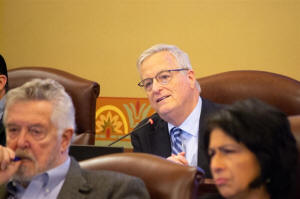Native American history, repatriation measures advance in Illinois House
 Send a link to a friend
Send a link to a friend
[March 28, 2023]
By NIKA SCHOONOVER
Capitol News Illinois
nschoonover@capitolnewsillinois.com
 SPRINGFIELD – In an effort to increase recognition of indigenous history
and culture, lawmakers are considering measures to repatriate Native
American remains and teach Native American history in public schools. SPRINGFIELD – In an effort to increase recognition of indigenous history
and culture, lawmakers are considering measures to repatriate Native
American remains and teach Native American history in public schools.
Last week, lawmakers approved both measures that seek to address past
harms inflicted on the Native American community and shift how the state
recognizes these communities in Illinois. They both head to the Senate
for further consideration.
Native American remains
House Bill 3413, passed unanimously out of the House, would ensure a
more concerted effort is made to return Native American remains and
cultural artifacts to their affiliated tribal nations.
According to the legislation, the director of the Illinois Department of
Natural Resources would work with the director of the Illinois State
Museum and federally recognized tribes with geographical and cultural
affiliation with Illinois to determine the tribal identity of these
remains. The remains and artifacts would then be returned to those
affiliated tribes.

The measure would also allow for the creation of a cemetery in which
repatriated Native American remains and materials may be buried. The
public would not be allowed to use the cemetery and it would be
protected by the state.
“[The bill] allows us to gather those remains and put them back where we
got them, to reinter them, to have their own cemetery, to bury them with
honor,” said Rep. Mark Walker, a Democrat from Arlington Heights and
lead sponsor on the bill. “For cultural artifacts that are funerary
artifacts, those become the property of the tribe most associated with
those burials.”
The artifacts that were buried with the individual would then belong to
federally recognized indigenous nations who may loan them to the museum
if they choose.
The measure would also create a Native American Review Group which would
examine the impact of state projects on culturally or religiously
significant properties. The group would have the authority to review any
request made to IDNR for a land permit on projects that would disturb
native remains.
The group would be appointed by the director of IDNR and consist of at
least one tribal representative from each of the more than 30 tribal
nations that have been identified as having a historical presence in
Illinois.
HB 3413 also creates the special tribal repatriation fund in the state
treasury. Subject to appropriation, the funds would be used for tribal
repatriation or internment.

“These are the remains that have been gathered in Illinois for 200 years
and they’re sitting in museums,” Walker said. “And so if we don’t
appropriate the money, we have to find the money elsewhere.”
Despite the 1990 passage of the federal Native American Graves
Protection and Repatriation Act, tribes around the country are still
waiting on the return of their ancestral remains and cultural artifacts.
According to a ProPublica series tracking the return of Native American
ancestral remains across the country, the Illinois State Museum has the
second largest collection of unrepatriated remains in the United States.
In the three decades since the federal law was passed, Illinois has only
returned 2 percent of the 7,700 remains it reported to the U.S.
government, or just 156 individuals.
[to top of second column]
|

State Rep. Mark Walker, D-Arlington
Heights, speaks at a House committee earlier this year. (Capitol
News Illinois Jerry Nowicki)

“It’s time to turn back the clock and do it right and put these people
back in the ground with honors,” Walker said.
Native American history
House Bill 1633, passed on a 75-32 vote, would require public elementary
and high schools to include Native American history in their social
studies curriculum, beginning with the 2024-2025 school year.
“Teaching our children true Native American history would not only teach
them of the things we are ashamed of but also the contributions of
Native Americans that have benefitted our state,” said Rep. Maurice
West, a Democrat from Rockford and lead sponsor on the bill. “This bill
is giving a voice to the very first of us.”
While the legislation does not actually create curriculum for the
history course, it does specify the unit should include Native American
contributions in “government and the arts, humanities, and sciences, as
well as the contributions of Native Americans to the economic, cultural,
social, and political development of their own nations and of the United
States.”
The bill also requires the unit of instruction to include descriptions
of large urban Native American populations in Illinois and, for grades 6
through 12, a section on the genocide of and discrimination against
Native Americans.
While the Illinois State Board of Education will provide instructional
materials and guidelines for the development of the curriculum, each
school district would be required to develop it on their own.

The floor debate included pushback on the way the curriculum would be
developed.
“I do want to stress to you, representative, that maybe when it goes
over to the Senate, there should be someone included in this process
that will hopefully make sure there’s an objective view when the
curriculum is written,” said Rep. Anthony DeLuca, D-Chicago.
In particular, DeLuca was concerned about how Christopher Columbus would
be represented in the unit of instruction, saying his story is essential
to Native American history as well.
West, however, said he had no intention of changing the bill in the
Senate.
“We are desensitized when it comes to a certain community of people and,
so no, I’m not going to change in this bill in the Senate,” West said.
“I’m standing firm on how this bill looks right now because there are
people of Native American descent who need to know that this legislature
stands for them.”
Additionally, the State Education Equity Committee, which provides
recommendations for advancing equity in education, will also include a
representative from an organization that works for “economic,
educational, and social progress for Native Americans.”
Capitol News Illinois is a nonprofit, nonpartisan news
service covering state government. It is distributed to more than 400
newspapers statewide, as well as hundreds of radio and TV stations. It
is funded primarily by the Illinois Press Foundation and the Robert R.
McCormick Foundation.
 |